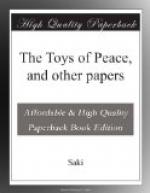to listen to the tramp of battalions that were bigger
and bolder and better skilled in war-craft than he
had deemed possible in that quarter; his eyes had
to read in the columns of his accustomed newspaper
a warning to the Grossmachte that they had something
new to learn, something new to reckon with, much that
was time-honoured to relinquish. “The
Great Powers will have not little difficulty in persuading
the Balkan States of the inviolability of the principle
that Europe cannot permit any fresh partition of territory
in the East without her approval. Even now,
while the campaign is still undecided, there are rumours
of a project of fiscal unity, extending over the entire
Balkan lands, and further of a constitutional union
in imitation of the German Empire. That is perhaps
only a political straw blown by the storm, but it
is not possible to dismiss the reflection that the
Balkan States leagued together command a military
strength with which the Great Powers will have to
reckon . . . The people who have poured out their
blood on the battlefields and sacrificed the available
armed men of an entire generation in order to encompass
a union with their kinsfolk will not remain any longer
in an attitude of dependence on the Great Powers or
on Russia, but will go their own ways . . .
The blood that has been poured forth to-day gives
for the first time a genuine tone to the purple of
the Balkan Kings. The Great Powers cannot overlook
the fact that a people that has tasted victory will
not let itself be driven back again within its former
limits. Turkey has lost to-day not only Kirk
Kilisseh and Kumanovo, but Macedonia also.”
Luitpold Wolkenstein drank his coffee, but the flavour
had somehow gone out of it. His world, his pompous,
imposing, dictating world, had suddenly rolled up
into narrower dimensions. The big purses and
the big threats had been pushed unceremoniously on
one side; a force that he could not fathom, could
not comprehend, had made itself rudely felt.
The august Caesars of Mammon and armament had looked
down frowningly on the combat, and those about to
die had not saluted, had no intention of saluting.
A lesson was being imposed on unwilling learners,
a lesson of respect for certain fundamental principles,
and it was not the small struggling States who were
being taught the lesson.
Luitpold Wolkenstein did not wait for the quorum of
domino players to arrive. They would all have
read the article in the Freie Presse.
And there are moments when an oracle finds its greatest
salvation in withdrawing itself from the area of human
questioning.
THE CUPBOARD OF THE YESTERDAYS
“War is a cruelly destructive thing,”
said the Wanderer, dropping his newspaper to the floor
and staring reflectively into space.
“Ah, yes, indeed,” said the Merchant,
responding readily to what seemed like a safe platitude;
“when one thinks of the loss of life and limb,
the desolated homesteads, the ruined—”




